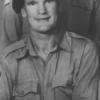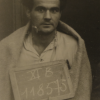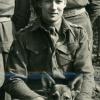I was in Cyprus commanding 3 Para when the Suez Canal business started. We were flown back to England where we did a couple of battalion exercises after which I gave them all leave. Everybody came back on the day including our reservists who had been called back for active service. Not a single chap was absent.
We went back to Cyprus for a very hot September where I made them train, against the doctor's wishes, on a minimum of water. Then the Israelis invaded and I was sent for on a Monday and told to plan for a real operation but not told where or when or how many aeroplanes until the Thursday. Making plans was difficult because I never knew how many aeroplanes we'd got. We had an odd Hastings and some Valettas; others were off dropping grain to the Hungarians. We had a lot of old-fashioned equipment and we had to string our jeeps up underneath the aircraft. I was very limited. In the event I had 660 parachutists and about 200 containers. We all had to live and fight with what we could take with us; I was all right as the CO because all I had was a flask of whisky, a few bullets and a toothbrush, but people like the signallers had probably a 100-pound load to stagger out with. But we had very few accidents on landing.
Frank King and I devised a plan where every plane had a cross-section of the battalion and on the day it worked. We went off at dawn as usual and I remembered at one period in the flight that the latest photos of El Gamil airfield seemed to be covered in little black dots. These had been verified by RAF pictures. The intelligence officer rushed in with these pictures as I was putting on my equipment in my tent before emplaning. He thought that they were anti-personnel mines. So I said, 'Thanks very much, you and I will keep this to ourselves.' He and I sat in that aeroplane wondering if we were going to be blown up as we landed. Anyway we dropped down, and those black dots turned out to be anti-aeroplane, 40-gallon oil drums, which in fact were good to hide behind when people shot at you. One or two people got hit going down, including our doctor, Sandy Cavanagh (who'd stroked the Oxford boat which sank), who was hit in the eye.
Well, we arrived and the airfield was quickly cleared. We then had quite a battle up towards Port Said. It was a bit strange because in that narrow area you had water on either side so you couldn't deploy a mouse. As we advanced, the ground varied from a little bit of desert to a sewage farm which was really like a Malayan swamp; then to a cemetery which had Christian and Moslem gravestones which people could hide behind. This was followed by another bit of open country, then a block of flats which made lovely OPs for the Egyptians to control their guns, so it was a strange couple of miles.
As I was standing talking to B Company commander, Major Stevens, who had been hit in the hand, there was a burst of fire and he was hit in the knee. We got him back and I gave the second-in-command, Karle Beale, the company.
I brought in C Company and planned a deliberate attack with what mortar and machine-gun firepower we had on the cemetery, which was proving a problem. We were also supported by the Fleet Air Arm who attacked the cemetery very accurately two minutes before we went in at 10.30 am. Suddenly from behind a gravestone up popped an Egyptian and pointed his musket at me, but my personal bodyguard, our PTI, Ray Issitt, promptly used his Sten gun and shot him. Great fellow.
By now there was a lot of action going on in the cemetery. We were shooting at the Eygptians, they were shooting at us and settling old feuds by shooting at each other with their new Russian rifles. Scattered around were a number of old and new corpses that had been unearthed by the bombardment. In the middle of this and our not inconsiderable fire-fight came a funeral party all wailing away. It really was a bit surreal. Anyway we finally cleared through the cemetery and the sappers dealt with the mess.
Brigadier 'Tubby' Butler went off by chopper to talk to his French counterpart and the Commander of Port Said, who'd just recently been to Larkhill and so was a properly trained officer. Then we were told there was a ceasefire. Most people got a pretty civilized night's sleep but 2nd Lieutenant Hogg and his men had to spend the night in the sewage farm with millions of mosquitoes. At dawn a Russian Mig fighter strafed us and caused two casualties.
Just after dawn, I found myself standing on the beach watching a combined operations amphibious assault from the enemy's point of view. We were firing machine-guns in support as the landing craft came in with marines. It was an amazing sight. We went on advancing to where the coast road and another road forked, where there was a hospital. My anaesthetist, Captain Malcolm Elliot, was running out of medical supplies so he went up to the hospital to get some but the people were furious and didn't want to help us. Another hospital a little further on the Egyptians had made a strong point and his patrol was fired on, wounding four. Sergeant 'Lofty' Read, whom they left behind for dead, managed to crawl back later that night, to the great joy of the battalion, and Elliot extricated the others, for which he got an MC.
We carried on advancing and we were supposed to link up with the Royal Marines but no marines appeared. Eventually we found ourselves on the edge of a suburban area and put ourselves in a fairly salubrious looking house. It ponged a bit of scent, and later turned out to have been a house of ill-fame. The mattresses were full of creatures which stayed with us for weeks. That was the night I and others were sitting round listening to the radio and thinking that the Russians were sabre-rattling most effectively with threats of retaliation worldwide. But we had to obey orders. So like Cinderella we came to a halt at midnight. The 2nd Battalion came ashore in the afternoon at Port Said and moved down with tanks to the south. I don't think they had much opposition.
We'd been there a week when we embarked on MV Australia and went back to Cyprus, where no-one turned out to greet us. Not only that, the Red Caps were there to search us. The French had apparently come in before us and it was alleged they had sold arms to EOKA. Well, after seeing some pasty-faced lance corporal patting the balls of my soldiers I said to the provost major, 'I will tolerate this no longer.' I was disgusted and disappointed with that and our welcome home. But all that aside the tremendous spirit and courage and efficiency of those young parachutists, many of whom had not been to war, was great. People have said it was a failure; it might have been politically, but we captured the place. We did our job. We did it well. It was also the last airborne assault carried out by the Parachute Regiment.
This article is reproduced from Max Arthur, Men of the Red Beret, (1990) Hutchison (ISBN 0-09-173931-4), by kind permission of the author Max Arthur.
Reproduced for ParaData by kind permission of Max Arthur
Source: Reproduced for ParaData by kind permission of Max Arthur
Read More




Latest Comments
There are currently no comments for this content.
Add Comment
In order to add comments you must be registered with ParaData.
If you are currently a ParaData member please login.
If you are not currently a ParaData member but wish to get involved please register.